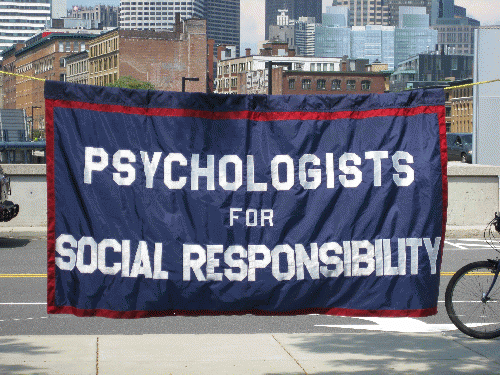In a statement released yesterday and reprinted below, Psychologists for Social Responsibility endorsed the Iran Nuclear Deal as an important and promising step toward greater peace.
PsySR Encourages Support for the Iran Nuclear Deal As Opening for Improved Relations
Psychologists for Social Responsibility was founded during the height of the Cold War, to apply psychological knowledge to help reduce the threat of nuclear war. Following this month's 70th anniversary of the U.S. bombing of Hiroshima and Nagasaki, we reiterate our support for complete nuclear disarmament by all countries, including a Nuclear-Weapon-Free Zone in the Middle East.
Within this broader context, PsySR welcomes the Iran Nuclear Deal as a triumph of firm diplomacy and a step towards reducing nuclear threats worldwide. We trust that this deal, rigorously negotiated in good faith, represents a critically important opportunity to reduce tensions, improve relationships, and increase regional and global security.
Initiatives that shift relationships with avowed "enemies" -- recall Nixon with China and Reagan with the USSR -- are always met with mistrust, exaggerated threats, and fear. People are more dangerous when afraid. As pioneer social and political psychologist Ralph K. White wrote years ago in Fearful Warriors:
The madness that is carrying the world closer and closer to nuclear war has at its core a psychological explanation: Each side, though fundamentally afraid, misperceives the nature of the danger it faces. Each side imagines that it faces an inherently, implacably aggressive enemy, when it actually faces an enemy as fearful as itself -- an enemy driven mainly by fear, to do the things that lead to war.
We recognize that today there are legitimate fears and concerns. But psychology has shown that fear-based decision-making leads to oversimplified zero-sum thinking and a tendency toward potentially catastrophic misperceptions and misjudgments regarding threats and solutions. When unilateral attempts to increase our own security provoke fear in our adversaries, these efforts are self-defeating and serve only to create a dangerous arms race. The best way to heighten security is to make your adversary more secure as well -- which is why provocative threats from the U.S., from Israel, and from Iran are all counter-productive.
Yet, at a time when a toning down of rhetoric is urgently needed, those who oppose the deal for political reasons are fanning the flames by promoting harmful and irresponsible monolithic images of Iranians as radical clergy and terrorists intent on getting a nuclear bomb. In reality, Iran is a complex, changing society of 80 million people -- one that includes moderates and progressives; a well-educated population with women the majority of university students; and a large youth population with many young entrepreneurs who are eager for improvement in Iran's international relations.
PsySR joins with experts in arms control, nuclear proliferation, nuclear physics, intelligence, and security and conflict studies in endorsing the deal. Prominent Israeli security experts and conflict analysts have also advised that the deal will make Israel more secure. And the deal is already having a moderating influence on Iranian society. Policies that provide hope can shift perceptions of the United States. Opening this new channel of dialogue represents a new beginning and creates the conditions for further progress.
If Congress rejects the deal, the U.S. will lose credibility and international standing. Rejection will also empower hardliners and may destabilize the region, potentially leading to war while fueling destructive conflict in U.S. domestic politics. In contrast, accepting this deal will strengthen U.S. leadership in diplomacy and help prevent a nuclear arms race in the Middle East. If accompanied by confidence-building measures and positive inducements rather than coercive policies, it has the potential to ratchet down tensions and transform the conflict. For decades the United States has had a rocky relationship with Iran, with many missed opportunities for constructive change. PsySR calls on the U.S. Congress not to miss this one.
(Note: You can view every article as one long page if you sign up as an Advocate Member, or higher).






